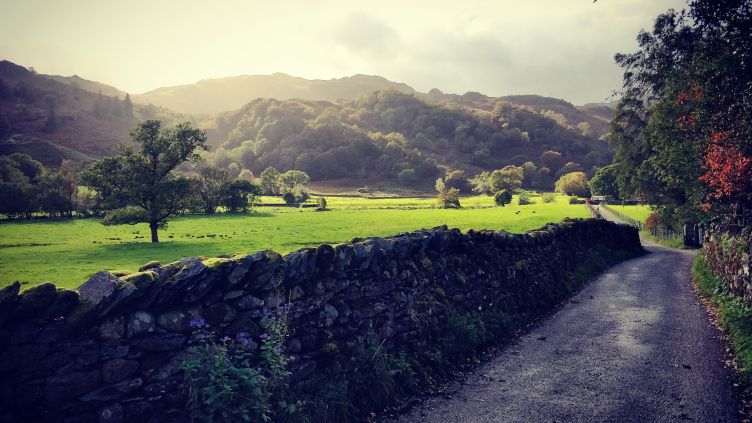
Brexit & Environment
Independent research and resources
Research Projects
Environmental Governance Island of Ireland Network
This academic network (funded by an ESRC/IRC network grant) brings together academics from Queen’s University Belfast and University College Dublin, together with NI Environment Link and the Irish Environmental Pillar to map existing cooperations, challenges and opportunities for all-island environmental governance after Brexit.
Our publications
We published our first briefing, on the Protocol and the Environment, in April 2021
Events
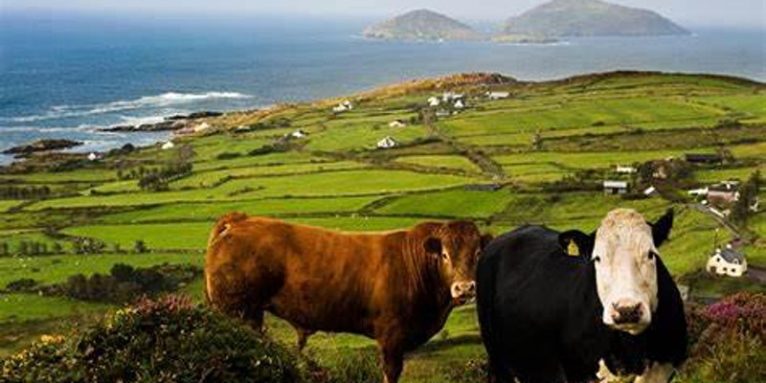
We are planning a range of online events during 2021. Our first took place on 15 February 2021, on the Protocol on Ireland/Northern Ireland and what it means for the environment. You can check out recordings of the event here.
Our second “Advising for Sustainable Food Production as an Island” is happening on 16th August 2021 and is currently open for registration. The event will bring together leading academics and farm advisors to develop solutions, ambitions and shared practices across Ireland’s border.
You can sign up for this event through Eventbrite.
Event Schedule
9.30 – Welcome and Introduction
9.45-10.45 – Advising for change – Understanding how co-production of farm advisory services can lead to environmental transformation
(Dr Katrin Prager, University of Aberdeen, and Dr Christina Noble, James Hutton Institute, Social Scientist in Agricultural Innovation)
11:00-12:00 – Advising sustainable food production through the food supply chain
(Professor David Barling, head of the Centre for Agriculture, Food and Environment Management Research at the University of Hertfordshire, Dr David Christian Rose, Associate Professor of Agricultural Innovation and Extension, University of Reading)
12:15-13:15 – Where next? Mapping ambition, challenges and opportunities for agri-environment change through advice Participatory session: we want to know what you think, based on your own experience and expertise are the key challenges and opportunities for agri-environmental improvement, and practical ways we can achieve it
13.15 – 13.30 – Closing remarks
Project participants
Viviane Gravey (Queen’s University Belfast)
Finbarr Brereton (University College Dublin)
Sean Kelly (Northern Ireland Environment Link)
Hannah Gould (University College Dublin)
Lisa Whitten (Queen’s University Belfast)
Michael Lennon (University College Dublin)
Sean Heron (Queen’s University Belfast)
Linda Fox-Rogers (Queen’s University Belfast)
Feidhlim O Shea (University College Dublin)
Agri-Environmental Governance Post-Brexit
The UK’s decision to leave the European Union is seen by the government as a unique opportunity to reform UK agricultural land policy. “Agri-Environmental Governance Post-Brexit” is a project by researchers from the Universities of Sheffield and Reading who will work with farmers, land managers, stakeholders and Defra to develop and test a model for co-designing the new post-Brexit Environment Land Management (ELM) system. The project has held workshops and interviews with stakeholderes conducted test, trials and pilots on participating farms and assisted Defra in their efforts to achieving an ELM system based on knowledge, experience and inputs of farmers, land managers, and other relevant parties.
The project is funded by a suite of ESRC funding examining the long-term governance implications of Brexit.
Selected Outputs
This project has produced multiple outputs, including the report below:
Project Participants
Dr Ruth Little (project lead) Sheffield University
Dr Judith Tsouvalis University of Sheffield
Professor Charlotte Burns University of Sheffield
Professor Sue Hartley University of Sheffield
Dr David Rose University of Reading
Divergence, dismantling and contestation: Brexit and the repoliticisation of UK environmental governance
‘Brexit and the repoliticisation of UK environmental governance’ is a UK-wide project (York, UEA, Cardiff, Dundee, Queen’s University Belfast) investigating potential divergence, dismantling and contestation in UK environmental policy and governance following the vote to leave the European Union. The project is funded by the ESRC and part of the UK in a Changing Europe Initiative.
Project participants:

Professor Charlotte Burns, University of Sheffield
Professor Neil Carter, University of York
Professor Richard Cowell, Cardiff University
Dr Fay Farstad, University of Sheffield
Dr Viviane Gravey, Queen’s University Belfast
Professor Andy Jordan, University of East Anglia
Professor Colin Reid, University of Dundee
Dr Peter Eckersley, Nottingham Trent University
UK environmental governance post-Brexit: What will happen to waste?
This project investigated the various ways that UK policy for waste and the circular economy might develop as the UK leaves the European Union. The report draws on interviews with key waste actors in the business, environmental and government sectors.
The project is funded by Cardiff University under its Impact Acceleration scheme.
Publications:
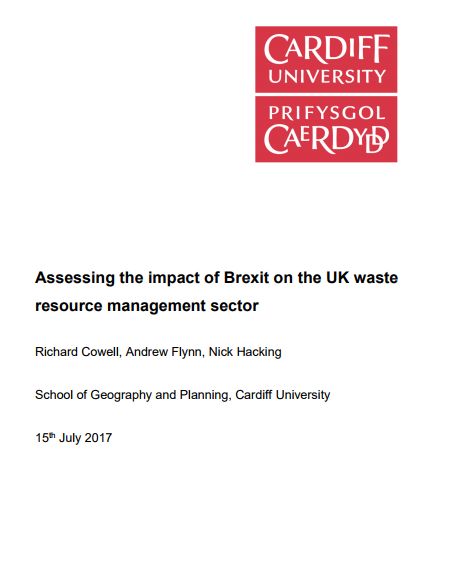
This project produced one policy brief assessing the impact of Brexit on the UK waste resource management sector (July 2017).
Events:
Expert seminars were held in Cardiff on 30 March 2017 and in London on 31 March 2017
Project Participants:
Professor Richard Cowell, Cardiff University
Dr Andrew Flynn, Cardiff University
Dr Nick Hacking, Cardiff University
Brexit and the future of UK and EU agri-environment and fisheries
Whatever kind of Brexit is negotiated, leaving the EU also means leaving the Common Agricultural Policy and the Common Fisheries Policy – the key frameworks regulating these sectors. We produced two reports bringing together current evidence and the views of stakeholders across both sectors, to identify priorities and examine the potential risks and opportunities for future policy, and to identify new governance options.
This project was funded by the ESRC IAA Brexit/Industrial Strategy Challenge Fund.
Publications:
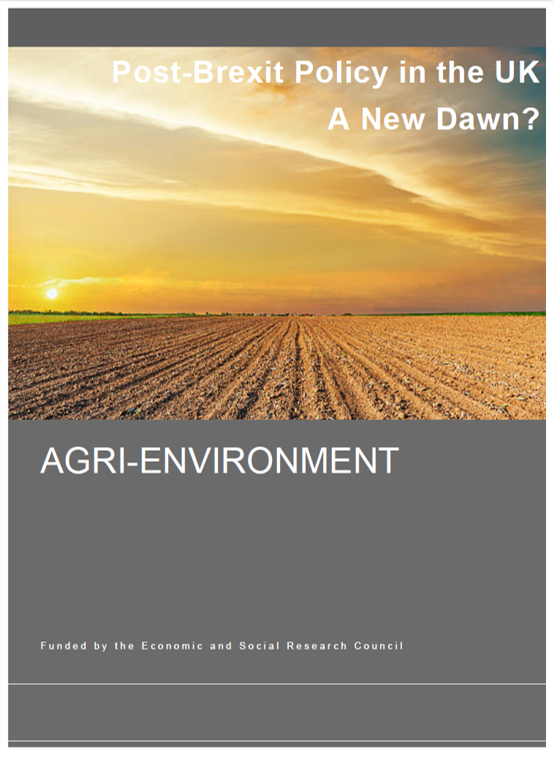
We produced two policy briefs analysing the constraints, challenges and opportunities for new UK agriculture/food and fisheries/marine policies.
Events:
We held two parallel stakeholder workshops in March 2017 at the University of York which fed into the two policy briefs launched in July 2017 in London.
Project participants:
Dr Iain Brown, Stockholm Environment Institute York
Dr Charlotte Burns, University of York
Dr Fay Farstad, University of York
Dr Viviane Gravey, Queen’s University Belfast
Professor Sue Hartley, University of York
Dr Adam Hejnowicz, University of York
Dr Kevin Hicks, Stockholm Environment Institute York
Dr Bethan O’Leary, University of York
Dr Bryce Stewart, University of York
The EU referendum and the UK environment: An expert review
Because policy making in the EU is often highly technical, its net effect on the daily lives of UK citizens and their local environment tends to escape media attention. This project offers a detailed review of the academic evidence on how EU membership has influenced UK policies, systems of decision making and environmental quality. It reviews EU-UK relations and discusses different scenarios for the future including two options following a vote to Leave: a ‘Norway’ option and a ‘Free Trade’ option.
This project was funded by the Economic and Social Research Council (ESRC) through its UK in a Changing Europe Initiative and Impact Acceleration scheme, and the Higher Education Funding Council for England’s Higher Education Innovation Fund.
Publications:
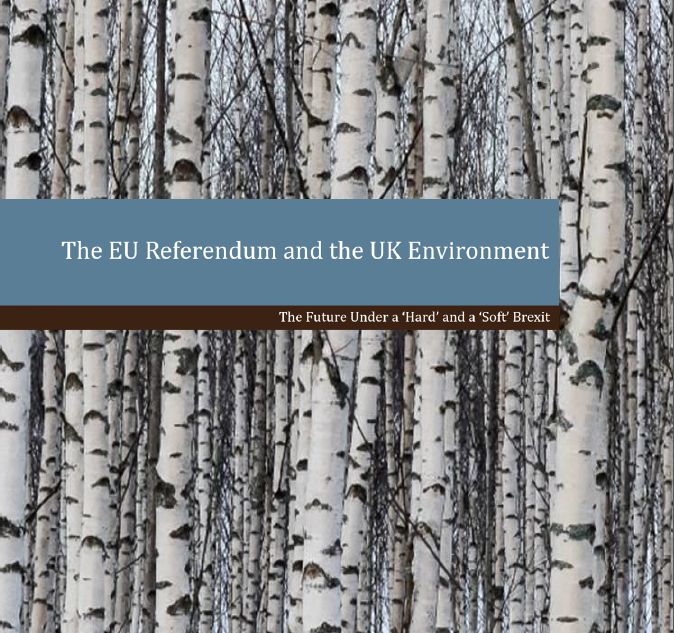
We produced a 60,000-word Expert Review (supplemented by an executive summary) on how EU membership had affected the UK environment (April 2016). We produced an updated brief on Soft & Hard Brexit in August 2016.
Events:
We launched our review on 11 April 2016 in London, and held discussions on its findings on 3 May 2016 (Norwich), 23 May 2016 (Brussels) 14 June 2016 (Oxford), 8 July 2016 (Oxford).
Project participants:
Dr Nathalie Berny, Sciences Po Bordeaux
Professor Simon Bulmer FAcSS, University of Sheffield
Professor Charlotte Burns, University of York
Professor Neil Carter, University of York
Dr Richard Cowell, Cardiff University
Joseph Dutton, University of Exeter
Dr Viviane Gravey, Queen’s University Belfast
Professor Andy Jordan, University of East Anglia
Brendan Moore, University of East Anglia
Professor Sebastian Oberthür, Vrije Universiteit Brussel, Institute for European Studies
Professor Susan Owens OBE, FAcSS, FBA, University of Cambridge
Dr Tim Rayner, University of East Anglia
Professor Colin T. Reid, University of Dundee
Professor Joanne Scott FBA, FRSE, University College London
Dr Bryce Stewart, University of York
2020 ©Brexit & Environment
